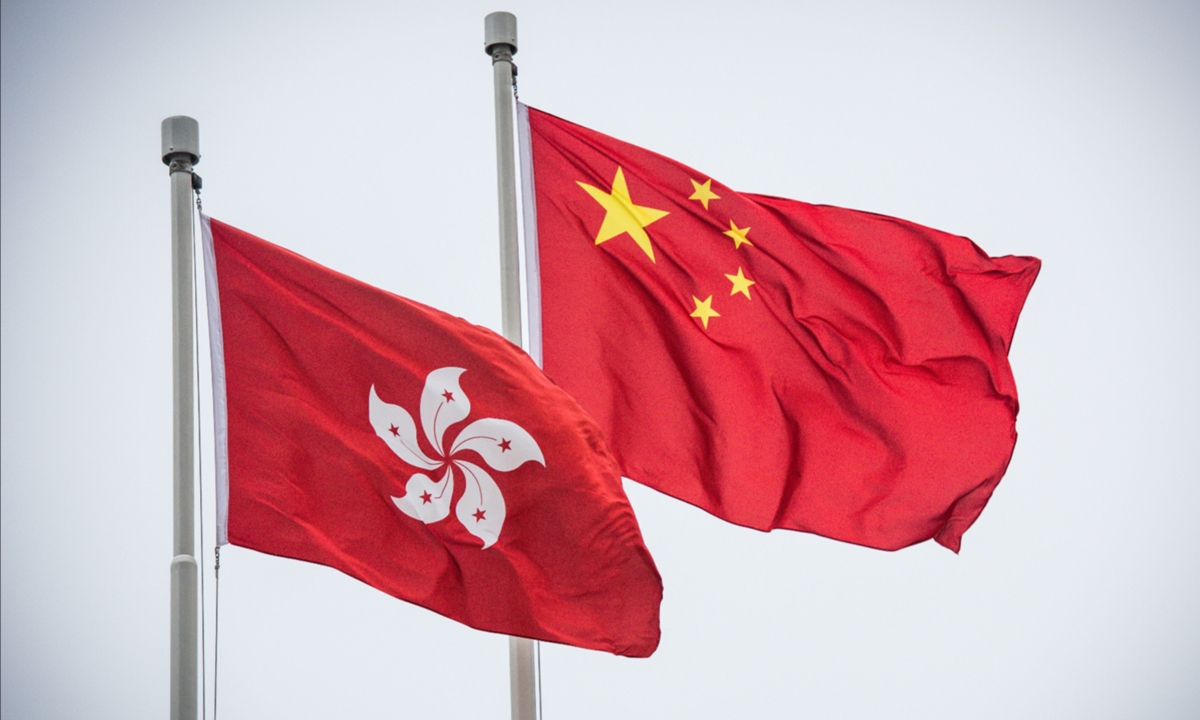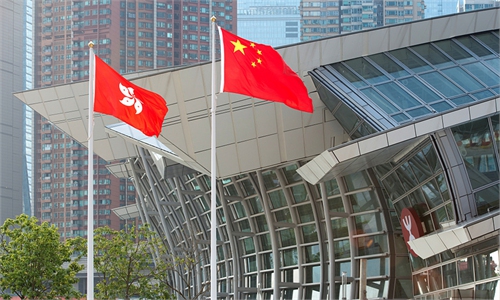Update: China’s top legislature unanimously approves HK electoral overhaul plan, laying out details

Hong Kong File Photo: VCG
After a two-day meeting of the Standing Committee of China's top legislative body and rounds of discussions, Chinese top lawmakers have unanimously approved the Hong Kong electoral reform plan, with revised measures for electing the Hong Kong chief executive and the formation of the Legislative Council (LegCo), which is seen as another major step in tackling the loopholes in the city's governance structure.
The amended Annex I and Annex II to the Basic Law of the Hong Kong Special Administrative Region (HKSAR), which specify the method for the selection of the HKSAR Chief Executive and the method for the formation of the HKSAR Legislative Council and its voting procedures, was passed at the closing meeting of the 27th session of the Standing Committee of the 13th National People's Congress (NPC).
Chinese President Xi Jinping on Tuesday signed presidential orders to promulgate the amended annexes.
Li Zhanshu, chairman of the NPC Standing Committee, presided over the meeting, which was attended by 167 members of the NPC Standing Committee.
Some of the major changes involve the proportion of seats in LegCo, which now include 40 seats from the Election Committee, 30 from functional constituencies and 20 which are directly elected, with the number of seats increasing from 70 to 90.
The current seats of super district councillors were scrapped, while newly added seats include HKSAR deputies to the NPC and HKSAR members of the National Committee of the Chinese People's Political Consultative Conference (CPPCC) - the top political advisory body - as well as representatives of Hong Kong members of relevant national organizations.
Also, a new section of 300 members has been added to the Hong Kong Election Committee, taking the total number of seats from 1,200 to 1,500. This section is comprised of HKSAR deputies to the NPC and HKSAR members of the National Committee of the CPPCC.
As for the Election Committee, the 117 seats returned from the district councillors have been scrapped, and the 183 new seats returned from regional organizations include district fire safety committees, anti-crime committees and representatives of associations of Hong Kong residents in the mainland.
"Excluding district councillors from the Election Committee is in line with Article 97 of the Basic Law to enable 'de-politicization' of the district councils, making them return to their original purpose of serving communities rather than becoming anti-China rioters' platforms for paralyzing the government and damaging 'one country, two systems'," Tam Yiu-chung, a member of the Standing Committee of the NPC, told the Global Times on Tuesday.
Another major change in the Hong Kong electoral system involves adding more candidates from organizations that love the country and love Hong Kong, including adjusting the seats of members of the National Committee of the CPPCC and representatives of Hong Kong members of relevant national organizations, which will allow more patriots to be part of the Election Committee.
While some observers have already suggested setting up a vetting committee to screen the candidacy of those who run for public office, the amended Annex I stipulates that the Candidate Eligibility Review Committee will be responsible for reviewing and confirming the eligibility of candidates for for Election Committee members and for the office of the chief executive. The Committee for Safeguarding National Security of the HKSAR shall, on the basis of the review by the department for safeguarding national security of the Police Force of the HKSAR, make findings as to whether a candidate for the Election Committee member or for the office of the chief executive meets the legal requirements and conditions of upholding the Basic Law and swearing allegiance to the HKSAR.
"The proportion of seats under the 40-30-20 plan not only ensures that patriots will work in LegCo, but also more importantly, it will enable LegCo to play the role of cooperating and balancing with the HKSAR government," Tam said.
The Chinese Foreign Ministry and the Hong Kong and Macao Affairs Office of the State Council all voiced support for the amendment of the two annexes of the Basic Law.
The new electoral system will further improve the city's political and social environment, the rule of law and business environment, and usher in an even brighter future for Hong Kong's development, a spokesperson of the Chinese Foreign Ministry said on Tuesday.
The electoral reform fully reflects the legislative spirit of implementing the principle of patriots governing Hong Kong. The governance power must be held by patriots, which is the basic political principle and unquestionable fact, said the statement.
It is the only measure that could root out the risks of "color revolutions" incited by some external forces and their political proxies, and shake off the endless political disputes and dangerous situation created by radical forces, so as to solely focus on economic development of the region and truly enhance the well-being of the general public, according to the office.
During this year's two sessions at the beginning of the March, a draft decision to improve the electoral system of Hong Kong was submitted to the country's top legislature, clarifying a series of targets for the electoral system overhaul, indicating the major principles to be followed during the reform process.
The goal of the overhaul is to make sure that the bodies of power in Hong Kong are run by patriots. The decision was overwhelmingly approved on March 11 at the closing of the two sessions, and a detailed overhaul plan is scheduled to be unveiled by the end of March, following which local authorities in Hong Kong will begin amending local laws.
Due to the urgency of the matter, it took less than 20 days from the decision adopted on March 11 to the detailed plan being released, which also showed that the central government paid great attention to Hong Kong electoral reform and had carried out a lot of preparation work before the amendment, some Chinese experts said.
"From the top level, it provides a clear and defined authoritative indication for local law amendment, and the HKSAR government can revise the main text of the relevant laws and their auxiliaries accordingly," Tian Feilong, an associate professor at Beihang University, told the Global Times on Tuesday.
The Global Times had reported that the detailed measures for Hong Kong electoral reform could come out in late March, given the urgency and complexity of the next phase of local law amendment in Hong Kong, and local authorities are expected to finalize the local law amendments by the end of May as there are three major local elections to be held in the next 12 months.
Since the decision to improve the electoral system for Hong Kong was adopted by the top legislature on March 11, some Western countries have not given up the fantasy of pressuring China by playing the "Hong Kong card," as some countries like the UK and Western-led blocs like G7 and EU have all come up with statements stigmatizing the overhaul.
China firmly believes that the electoral reform and the earlier national security law for Hong Kong, as well as other potential reforms that could take place in the future, are "the right things to do and must be done," whether the West likes them or not, analysts said.
"Under external pressure, the central government has never shown any sign of retreating, but will adhere to its principles while keep on fighting," Tian said, noting that the so-called sanctions imposed by some Western countries are the last desperate struggle, which will turn out to be meaningless.


